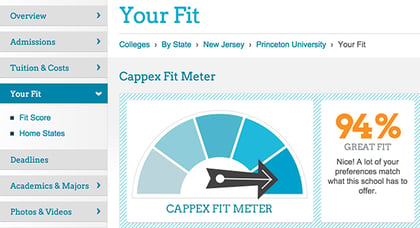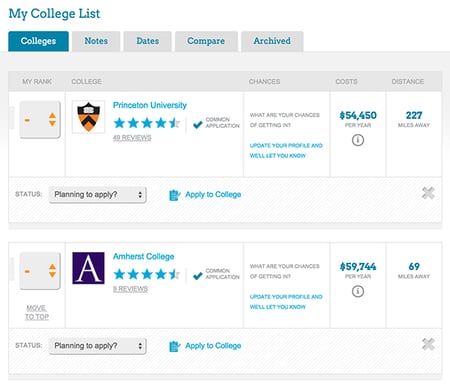
As a high school student, you might be overwhelmed and scared by the college search process. You're probably asking yourself, "What college should I go to? What college is right for me?"
It’s not easy to choose a college that’s right for you, especially when you have over 2,000 options in the US alone! To find a school that will truly make you happy, you have to be honest with yourself about what components will make up the most fulfilling college experience based on your interests and personality. This article will give you the tools you need to choose a college that’s the right fit for your goals.
Self Reflection
Before you do anything else, sit down and ask yourself the hard questions. Think about who you are and what you want to get out of college. This is admittedly tough to do - if you’re anything like me in high school, you’re still feeling pretty unsure about your future plans. When I say to think about “who you are”, I mean that you need to evaluate the interests and personality traits that most strongly affect your daily life and consider how they will impact your college experience. If you’re very introverted, for example, you may feel uncomfortable at a big party school or in a city environment. If you’re a super picky eater, you should look for colleges that have a flexible meal plan and a wide variety of food options.
As for what you want to get out of college, this can be more complicated, but it boils down to thinking about your academic interests and any other activities you plan on continuing in college. If you have a field of study in mind, then you should go somewhere that has strong academic offerings in that area. You may be surprised at which schools have great programs. Just because you haven’t heard of a school doesn’t mean it’s not an awesome fit for you!
If you have some idea of your interests but haven't settled on a major, look for schools that will give you the opportunity to explore your interests further within the context of a well-rounded curriculum. Try not to lock yourself into any one field of study yet. To give a personal anecdote, when I went to Dartmouth I started out as a Government major, then switched to a History major, then decided to be a History and Studio Art double major, and finally ended up dropping History altogether and becoming a Studio Art major with a Digital Arts minor. I never would have expeted myself to end up as an art major when I was in high school, but I'm very thankful that I went to a college where that was a viable option.
Here Are Some More Questions to Ask about Your Academic Preferences:
- What are your greatest academic strengths and weaknesses?
- Do you prefer learning in a small discussion group or in a large lecture class environment?
- What was your favorite class in high school?
- How do you do with academic struggles and pressure?
- Do you take a lot of advanced classes? What’s your GPA and how does it compare to other students at your school?
- Do you have any learning disabilities or concerns that might impact your academics?
Answering these questions will help you determine the type of academic environment that will suit you best in college. Based on your answers, you can look at the class sizes at schools that interest you to see if you’ll end up in mostly large or small classes. Your answers will also help you focus on a realistic range of colleges based on your GPA and ability to handle academic stress. Again, check to see if schools have academic offerings that align with what interested you most in high school even if you're not sure that you'll pursue that interest as a major. You want to be able to take classes that you feel are worthwhile experiences even if they aren't a part of your ultimate academic concentration.
Academics may be the main point of college, but the majority of your time won't be spent in classes. There are many other factors that will impact your comfort and happiness while at school.
Here Some Non-Academic Questions to Ask about What You Want Out of Your College Experience:
- Are you kind of a hermit or do you plan to party it up? Introvert or extrovert?
- Do you like quiet, natural settings or an exciting city life with tons of stuff to do (or something in between)?
- Are you ready to be far from home?
- What values are most important to you? What are your political leanings?
- Is cost a factor that you need to take into account?
- What are your favorite activities, and which ones do you want to continue pursuing in college?
- Are sports important to you?
- What are you proud of about yourself, and what makes you unique?
Based on your answers to these questions, you can create more focused search criteria. If you know you want to be close to home, for example, just look at schools in your state. If you have a unique passion or talent, find schools that have organizations to help nourish that talent. It's important to have access to creative outlets and a pleasant living environment that lends itself to learning and having fun at the same time. The academic offerings at a school may be excellent, but that doesn't mean you should go there without considering how you'll feel about the social scene or the surrounding area.
The most important question to ask yourself is "What makes me happiest?" Even if you feel like you “have” to go to a certain school or your parents are pushing you in a particular direction, try to focus on what YOU really want. If prestige is a priority for you, that’s fine, but make sure it’s actually valuable to you and not just to your parents or others who might influence you. College is four years of your life, and that’s not something to take lightly. You’re the one who will be having this experience - not your parents, not your friends, and not your teachers. In the next section of this guide, I’ll go into more detail about the main qualities to consider in your college search.
 Who am I? (Please tell me you've all seen Zoolander. Please tell me I'm still relevant.)
Who am I? (Please tell me you've all seen Zoolander. Please tell me I'm still relevant.)
Narrowing it Down: First Steps
There are a few basic distinctions between schools that will help you narrow down your college choices based on your answers to the self-reflection questions above.
Public or Private?
You might apply to a mixture of public and private colleges, but it’s important to know the differences between the two. Costs are usually lower for public universities if you’re an in-state student, but some private schools do offer generous financial aid. You can expect larger enrollment at public schools and a wider array of academic programs, as well as more diversity of student body. Public schools tend to have bigger party scenes and often bigger class sizes with more classes taught by TAs. Private schools may provide a more close-knit student community and more leadership opportunities due to smaller class sizes.
Urban or Rural?
This is a key factor in narrowing down your choices. Think about what type of environment is best for you and how it compares to the school's surrounding community. Is it a safe area? How isolated is it? If you enjoy being in nature and want to attend a school with a really defined campus, you should look into schools with more rural settings. If you’re mainly concerned with having places to go out and being able to do a wide variety of activities, you should look at more urban schools.
There are also many schools that are a mixture of the two environments and may have a defined campus but also easy access to a nearby city. Rural schools provide a community that's far more insular and differentiated from the rest of the area than urban schools where the student population and city population mix freely.
Large or Small?
This factor is partially related to the private versus public question, but some private schools are very small while others are the same size as large public schools. If you think you’ll feel more comfortable in a small, close-knit community where there are more opportunities for you to hold leadership positions and make direct changes, then you should look at smaller schools first. If you prefer a place where you can be semi-anonymous and have consistent opportunities to meet new and diverse people, then you should look into larger schools. Keep in mind that schools with more students tend to have bigger party scenes and larger class sizes.
Close to Home or Far Away?
Some people can’t wait to get away from their families, and some are reluctant to leave. You should decide which type of student you are so that you don’t choose a school that’s too close or too far away and regret it. Being a new college student can be isolating and scary initially, especially if you're shy. You may want to be able to come home from time to time and see some familiar faces.
To use another personal example, when I applied to college, I ended up deciding between Dartmouth (in New Hampshire) and Pomona (in California) as my final choices. I picked Dartmouth because I knew it would be too hard for me to be across the country from my friends and family in Massachusetts (even though Pomona would have had perfect weather, and you can go to the beach and go skiing in the same day there...oh God what have I done). In all seriousness though, I know this was the right choice for me because I wasn't ready to be totally on my own yet. If you don’t deal very well with change and you want to be able to visit home more than a couple of times a year, you should look into schools that are closer to your hometown.
 Wanting your parents to do your laundry is not a valid reason for going to college close to home. Plus, based on this picture I think the portal to Narnia relocated to a laundromat dryer, so that's something to look forward to.
Wanting your parents to do your laundry is not a valid reason for going to college close to home. Plus, based on this picture I think the portal to Narnia relocated to a laundromat dryer, so that's something to look forward to.
Narrowing it Down Part II: Going Deeper
Now that you have a vague idea of which type of school you’d like to attend, you can examine other factors that might impact your decision on whether or not to apply. I’ll go over how to find this information in the next section on researching colleges. For now you can just start brainstorming which of these factors are are most important to you. Write down your thoughts so you can use them to guide your search later.
Academic Environment
What is the attitude towards academics, and will it match up with your personality? This is mostly just a matter of looking at how selective the school is and what types of students attend. What are the GPA and standardized testing stats for students who were accepted? Based on this, do you have a shot at admission?
This is also where you might consult student reviews about the quality of classes and teaching. Is there a focus on undergraduates? In some cases, classes are taught by TAs rather than professors (this often happens at large research universities). If getting individual attention and having a strong relationship with your professors is important to you, you might consider a college where professors are more focused on teaching.
What about facilities such as libraries, computer labs, and art studios? Make sure you’ll have all the resources you need to pursue your interests. You can find out more about these types of resources on school websites or through one of the sources I'll discuss in the next section.
Program Strengths
If you know of a specific program that you’re interested in, look for schools that have strong offerings in that area. As I mentioned before, most colleges have websites for each academic department, so you can consult these in your search. You will also be able to sort schools by major offerings in many online databases.
If you're still undecided, you don't have to target your search toward specific programs. Instead, try to seek out schools that offer many different majors or provide a holistic liberal arts education so that you can explore various subjects more thoroughly before making a final decision.
Social Life
What’s the social scene like at the school? You might not want to go to a college that’s dominated by frat parties or one that’s all studying all the time. To find out what schools are like in this respect, you can look at student reviews on the social life and party scene. These factors are rated in most college databases.
Some good places to start for information on social life are Zinch and Unigo, which give grades and ratings for campus life based on student reviews. Cappex, which is my top recommendation for a college search site, also has a ton of student reviews on topics like greek life and overall student happiness.
Food
I’m not gonna lie, this was one of my most important criteria for choosing a college. If you have dietary restrictions or preferences, make sure there will be enough options. I visited some colleges that my high school friends attended where I would have had to survive on cheese pizza and iceberg lettuce as a vegetarian (and I am NOT a picky eater). You have to meet your basic survival needs before you can learn properly, so check out student reviews about campus dining to see whether the meal plan sounds good.
Athletics
Do you plan on playing sports? Are there opportunities to play intramural or club sports if you’re not on a varsity team? Check out the gyms and athletic facilities for different schools. Most will have separate websites devoted to these facilities and athletics in general. There should be lists of club and intramural sports as well as details about the resources offered by athletic facilities.
You can also look at reviews on student life to see if people seem to be enthusiastic about sports and fitness overall. Look for a place where there's a community of people who share your interests. Maybe there are informal clubs that are sports-oriented but are more for fun than for competition. Check out lists of student organizations and see what comes up!
Extracurriculars
If there are extracurricular activities that you’re currently invested in, make sure you’ll be able to continue them in college. You should also check if there are any extracurricular opportunities that sound cool to you that you haven’t tried before. Most schools will have listings of their student clubs and organizations online, so if you think you're interested in a college, you should check out the offerings.
Study Abroad
Most schools have study abroad programs now, but you might find that there’s a specific program that appeals to you more than others. If there’s a place you want to go and you know a school has a well-reviewed program that travels there, you might consider this as a factor in your choice. School websites usually have a section that's devoted to their study abroad programs, since this can be a big selling point for students. Exciting opportunities to experience the world abroad could impact your decision about including a school in your list.
Diversity
Do you want to meet people from diverse backgrounds who have a variety of different life experiences? This usually goes hand in hand with attending a larger school, but sometimes smaller schools are surprisingly diverse. Most college information sites will give statistics about student ethnicity and percentages of international students.
Another factor to consider here is the male/female ratio of a school (if you're even planning on attending a co-ed school). Some schools have very skewed ratios, although many are evenly balanced. This is another statistic you will find on almost every college information page on the internet.
Cost
Don’t rule out any schools because of cost yet, but this is definitely something to consider. Look for colleges that have strong merit-based aid programs and/or guarantee that they will meet all financial need, and consult statistics on financial aid. These stats might not mean that much for you individually, but many schools have financial aid calculators available online that can help you understand what to expect. Check out scholarships to supplement your financial aid using Fastweb, a site where you can get matched up with the best scholarships for your situation.
Other
Is there something else that’s important to you that I didn’t list? That’s great! If there's a special quality that you value but isn't related to any of the categories above, it’s still a valid reason for either eliminating a school or considering it as one of your choices.
 Juggling club: The ultimate passport to social acceptance in college
Juggling club: The ultimate passport to social acceptance in college
College Research Tips
How can you weed through all of this information to find schools that fit your priorities? There are tons of resources out there, so you might not know where to start. Rankings aren’t always the most reliable because they usually just list off name brand schools that don't always make sense for your criteria.
The best way to narrow down your search is to go online and use a college matching service. There are some great resources for students that will conduct very specific searches to help you find your ideal college matches. My top recommendation is Cappex.
Cappex has pretty much every feature you can imagine to help you sort through the huge piles of statistics and arrive at logical conclusions about which schools will be your best bets. You should fill out a free profile, which will ask you basic questions about your preferences based on most of the major factors I listed earlier. Try to be as thorough as possible so you get the best matches!
Cappex will suggest schools based on your preferences, and on each school’s page you can look at “Your Fit”. This is a meter (pictured below) that gives you a percent match based on how well the school’s offerings align with what you’re looking for:

The site will point to schools that line up with your basic criteria, and you can look more closely at their detailed info pages to see if they have other qualities that interest you. Check out student reviews to see what people really think of the school, or look at one of the other categories on the side bar to get a better idea of the surrounding community, admissions requirements, and academic offerings. When you find schools that you like, you can add them to your college list, a feature attached to your profile that allows you to save schools that strike your fancy.

The site also allows you to compare schools on your list against each other by putting their stats side by side. This makes it easier to choose between two similar schools. Cappex takes you straight through to the application process by providing a link to the application page for each school on your list and telling you which ones accept the common application. You can even check your chances of admission to each school to see whether it’s a reach, a possible, a probable, or a solid bet for you. This will be important in balancing out your list of schools later.
Other sites that you may consult for more easily digestible student reviews and grades on different aspects of student life are Zinch, Niche, and Unigo. Cappex is the best place to make a list of schools, but remember that if you don't find the information you're looking for in the school profile, you can look elsewhere (on the school's main website or at other college search sites).
You may consider purchasing a college guidebook if you want to supplement your online search, although at this point guidebooks probably aren't necessary considering the amount information that’s available online. If you’re still interested in getting one, the two main guidebooks I would recommend are the College Board’s College Handbook and the Fiske Guide to Colleges. The College Board's College Handbook has all the stats for colleges, so it’s more of an objective look at the facts about each school.
The Fiske Guide to Colleges gives you a more subjective look at colleges. It uses student responses about their experiences to write an essay about each college that touches on all its main qualities. This can be a lot more fun to read and easier to digest than a book of statistics, but there is also inevitably a lot of bias in student testimony. It will still give you some good facts, though, and you’ll have a more holistic look at the personality of each college.
If you have the opportunity, take advantage of events at your school or in your area such as college fairs or college representative visits to find out more about colleges. Keep in mind that this is more useful after you’ve already pinpointed some top choices. These events may not give you all the information that you’re looking for, and students often walk away with a bias that’s based on whether you liked the person you talked to rather than whether the school is actually right for you.
Overall, be wary of rankings and blanket statements about schools. Your college search is all about what's important to you, so don’t prioritize things that are only important to someone else!
 They may seem warm and fuzzy, but blankets will only fill your head with LIES.
They may seem warm and fuzzy, but blankets will only fill your head with LIES.
Making Your College List
When you decide on your final list of colleges, you should be considering schools that exist across a fairly wide range of selectivity and cost. Think about priorities versus preference. You might have a preference for one quality in a school, but it won't make or break the experience. What are the MOST IMPORTANT qualities that need to be present for you to get the most out of college? Make a list of your top 5-10 requirements for a college based on the qualities listed in the sections above and your self assessment.
Factors to Consider:
- Public or private
- Setting (urban or rural)
- Size
- Location (close to home or far away)
- Academic climate
- Academic programs
- Quality of social life
- Athletics
- Extracurricular opportunities
- Study abroad
- Diversity of student body
- Cost/financial aid generosity
- Any other stuff that is important to you!
Using Cappex or another research tool of your choice and your own list of priorities, make a list of fifteen or so schools that you believe are good fits for you. Again, in this process, start with the big priorities. You can sort schools by location and major availability on Cappex, and for any school that’s suggested to you you’ll get a small panel of statistics that indicates the cost, location, and size of the school.
Once a school fits the basic criteria, you can start looking at the other factors I mentioned based on statistics in the school’s full profile. There may be many schools that have the right location, major options, and price range, but they all have subtle differences. If you make a large list of schools at first and are having a hard time differentiating between them, try the tool that allows you to compare school statistics side by side so you can see if there are any discrepancies you may have missed.
Looking at the student reviews can also be helpful in sorting out which school sounds like a better fit for you. Even if two schools look similar on paper, they may be different in that one has a stronger sense of community or students are overall more engaged in learning. These are things you’ll only learn from the students themselves.
Now it’s time to balance your list so that you have a nice range of schools, which means evaluating admissions statistics in relation to your qualifications.
Schools Fall into Four Different Categories:
#1: Reach. You would really really like to go to this school, but your chances of being accepted are small.
#2: Possible. Your chances of being rejected are higher than being accepted, but the school does accept some students with your credentials.
#3: Probable. Your chances of being accepted are higher than your chances of being rejected.
#4: Solid. You will almost certainly get in. The school rarely rejects students with your credentials.
Include at least one solid school, one probable or possible school, and one reach school in your final list. Note that Ivy Leagues and other schools with admissions rates of less than 15% are reaches for all students, even those with a 4.0 and perfect test scores.
To figure out your chances of acceptance manually, look up the SAT/ACT score and GPA ranges for the schools on your list. Most schools provide a range for the middle 50% of SAT/ACT scores for accepted applicants. If you scored significantly higher than the high point of that range, then that school can be considered probable or solid.
The same applies to GPA statistics. If your GPA is in the top reported range for the latest class at the college, you’re likely to be accepted. Cappex also will give you your chances of admission at each school if you fill out a profile with your scores and GPA, so you don't necessarily have do all of this legwork yourself.
If cost is a significant factor for you, don’t rule out any schools based on them being “too expensive” yet. Start researching which schools offer the best financial aid packages. Often, college websites include financial aid calculators and provide details about their merit-based aid and grant programs.
For research on cost, including financial aid, scholarships, and loans, I would recommend creating a profile on Fastweb. It provides an easy way to search for scholarships that match your needs and includes a search feature for loans as well as a guide to figuring out your financial aid. It's the best place to go for college monetary concerns.
By this time, you'll have a list of schools that align with your needs and goals, and you can start planning college visits and putting together the different components of your application!
 Amherst College...what are they REALLY hiding behind all those trees? You'll have to visit to find out.
Amherst College...what are they REALLY hiding behind all those trees? You'll have to visit to find out.
Summary
The most first thing you should do when deciding where to apply to college is assess your preferences and personality so you can find schools that suit you well. There are many different factors to take into account when choosing colleges, including location, size, cost, academic programs, and various other opportunities. You can use online resources, college guides, or events like college fairs to conduct your research. I would recommend online resources first as the simplest way to sort through your options.
Keep your personal preferences in mind at all times, and avoid being pushed by rankings or prestige towards a school that isn’t a great fit for you. Then, make a list of schools that you think you’ll like. Try to narrow it down by balancing your list based on selectivity and cost.
The Steps for Choosing Colleges:
1. Do a self-assessment
2. Consider broad factors that might affect your choice
3. Consider more specific factors that might affect your choice
4. Research schools
5. Make a list of schools based on your top priorities
6. Narrow down the list so that you have a balance that includes at least one solid, one probable or possible, and one reach school
If you’re honest with yourself and do some serious research, you’ll end up with a list of amazing schools that offer all the opportunities you're looking for in your next academic journey.
What's Next?
Have you set your sights on the top colleges in the nation? Read this article for advice on how to get accepted to Harvard and other Ivy League schools. If you're worried about getting into college at all, read this article on the easiest schools to get into.
Worried about choosing a major on your college applications? Learn how to navigate the process and make an informed decision.
If you're planning your college essay, read this advice on what to avoid in your writing.
Your SAT/ACT score is really important for getting into college. Find out how high of an SAT or ACT score you need for admission to your top choice schools.





